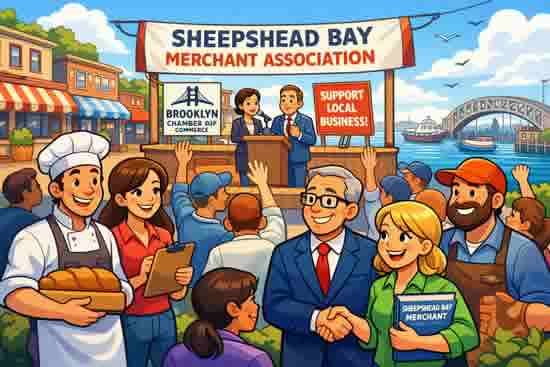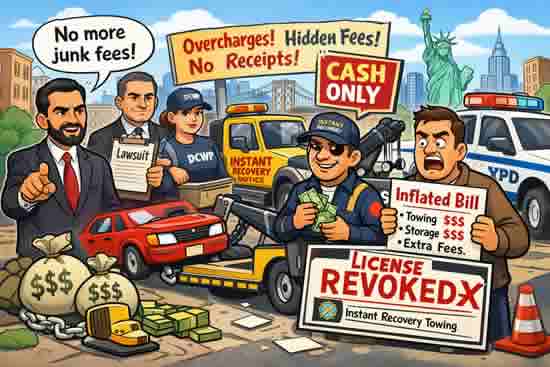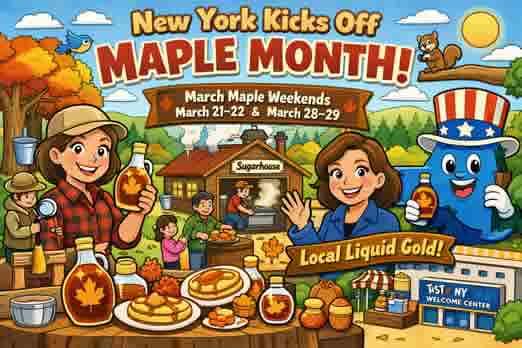On 107.5 WBLS’s “Hear From the Mayor,” Eric Adams and guest Faqueni Ravel of Venture House Bronx spotlighted New York City’s clubhouse model for mental health—community spaces that help members build skills, find jobs and housing, and belong. Adams noted the city has opened 13 newly contracted clubhouses across all five boroughs with a goal of serving 6,600 members by 2027; Venture House is open 365 days, free to join, and active on holidays like Thanksgiving. Callers raised concerns about more than 5,000 vacant NYCHA apartments and missing garbage pails; Adams said mayoral control over NYCHA is limited due to receivership and a special monitor amid an ~$80B capital backlog, and he pledged to reinforce DSNY policy on returning pails. The show invited New Yorkers to keep engaging directly with City Hall on services and support.
Transcript: Mayor Adams Hosts “Hear From the Mayor” Radio Show
Gary Byrd: As you know, each and every second Sunday of the month, normally WBLS is proud to welcome the 110th mayor of New York City and second mayor of color, first hip-hop mayor in the city’s history. But we’re on an extended schedule this month and proud to bring back our mayor, Mayor Eric Adams on 107.5 WBLS. Mr. Mayor, good morning and welcome.
Mayor Eric Adams: Hey, thank you, Gary. And yesterday was a really somber but powerful moment for a good brother, Brother Lloyd Williams. And he just meant so much to so many people in general, but specifically he meant a lot to me. And so I was happy just to celebrate a life well lived. So I want to say to the audience, welcome back.
This is Hear from the Mayor, your mayor, Eric Adams, and if this is your first time tuning in, the purpose of this show is just to have a dialogue and hear directly from you. So listeners should give me a call and hear directly from your mayor on what we are doing to build a better New York. And you can sign up to hear more from me by visiting nyc.gov/HearFromEric. You can sign up on our website to text with Eric and talk with me on WhatsApp.
For today, though, please feel free to call in 212-545-1075. I want to say happy Sunday to everyone. And really, this is such an important topic that we’re going to have today. I have an amazing sister here, Faqueni Ravel, director of Venture House Clubhouse in the Bronx. And many people say, what is a clubhouse? What does that mean? And I didn’t even know what it was until I got into the Mayor’s Office.
I was hearing about it when I was campaigning and just really impressed with clubhouses. And we’re going to let sister Ravel just share with us the foundation of it. But let me say this. Everyone is going through some form of mental concern, I would like to say. Some is more severe than others. All of us feel a level of sadness sometimes, a level of depression sometimes. Some is more severe. And we need to be there for our fellow New Yorkers as they experience a level of mental illness.
But it’s nothing to be ashamed about. And you should not feel as though you cannot communicate with those who understand how to cycle us out of those moments. And that is what we believe clubhouse, the model, is one method that should be used. So I want to really celebrate this administration and what we have done.
We opened the first time in nearly 30 years, we’ve opened up a process for new clubhouses to be opened. And as a result, our administration has opened 13 newly contracted clubhouses across the five boroughs to serve adults living with severe mental illness. And the numbers are impressive, 6,600 members by 2027 is our goal. And our guest today is going to really break this down for you. So Faqueni, can you just first tell us, what is a clubhouse? The ABCs of a clubhouse.
Faqueni Ravel, Director, Venture House Bronx Clubhouse: ABCs. Well, good morning, everybody. I’m excited to be here. Thank you, Mayor Adams, for inviting us over and for your leadership in New York. We’re proud and we’re very excited to be here and to talk about the best kept secret, right? It’s been the best kept secret for such a long time until the Mayor Adams administration has put a spotlight on it. And the clubhouse model is good news for people with mental health issues.
It’s like the gospel of it. It’s a community-based model that helps individuals work side-by-side and gain access to employment, housing, civic engagement, the arts. They work and help us run the clubhouse side-by-side. We have units devoted with goals, a mission, and a vision. We have a commercial kitchen where members come and they work with us.
You have the administration unit, you have an education and employment unit, and the clubhouse model is to help focus on the strengths rather than the illness, right? So members are much more engaged and they’re able to apply their talents in the work that they like to do. So it is rooted in the concept that work is restorative.
So there’s conventional ways of treatment and therapy and that helps, right? We want to get our therapy, we want to take our prescribed medications, but then what happens later when a person leaves their psych office and doesn’t have a place to be? So they come to the clubhouse.
Mayor Adams: And that’s what I enjoyed about the clubhouses that I have visited. And I think the best way, in my layman analysis, is that when you’re dealing with severe mental health illness, you go to your medical professional for your help. And then when you leave that medical professional’s office, who is there to support you as you find your way to continue being part of society.
So when you walk inside the door of a clubhouse, you’re not judged, you’re not afraid to state what you’re going through to help you get through what you’re facing. And that’s what I saw. When I was up in the Bronx, at Venture, I saw people who came in shy, afraid to talk about their mental health illness. But then the clubhouse, all of a sudden, said, you’re not alone. And you do it in a creative way, such as cooking. How does that help people reintegrate themselves?
Ravel: Absolutely. So like I said before, when they walk in, and thank you, Mayor Adams, for saying that, they walk in sometimes highly medicated, right? Or sometimes they walk in and do not want to speak with anybody. And once they feel the energy, the clubhouse, each clubhouse has its own culture. And they’re introduced through a tour. And once they start working in a unit, first, in their minds, they’re stigmatized. They’re also marginalized.
They have been told that they’re unable. And once they start working in something that’s meaningful, and they start connecting with others that have, they might have the same diagnoses. So they’re working side by side with a member and a staff. They’re able to not just reintegrate into the clubhouse overall, and they start running and they start taking initiatives. They start taking leadership. They become stakeholders of every work that we do there. And they start to have that voice that was taken away from the mental health issue that they might be living, right?
So they speak on these things, and the recovery is seen throughout their attendance and their participation in the clubhouse community. And they just slowly but surely, organically, they integrate. And it shows, and it equals to recovery overall. When someone is out there, I mean, you could be completely sane and not have a job, and you feel like you’re coming down with something, right? So the minute that you feel that you have purpose and you have value, and you’re able to identify your own strength and be attached to a specific meaningful task, then that’s recovery, that’s reintegration.
Mayor Adams: You know, it is as though when I visit the clubhouse, particularly up in the Bronx, it is as though people are invited and they’re saying, it’s okay not to be all right, because we’re going to help you be all right. You know, and finding ways to do that.
Now, I know I saw the cooking, they were preparing their own meals, and the food was excellent. What are some of the other things that they do to take a person from that shyness, that feeling as though that no one understands what they’re going through, to, okay, you’re fitting, you have a home here?
Ravel: Absolutely. So we tried, this is a person-centered care approach. And the first thing we want to let the individual know is that we know that you’re here, we’re all in this together, let’s work together. So besides the commercial kitchen that we run, there are other units devoted into certain tasks, like education and employment. And we have members there that are seeking employment and helping other members to seek employment and seek education.
We have members helping other members, you know, seek housing and obtain housing as well through these units. We have members working in the newsletter, publishing the outcomes that are happening in the clubhouse, spreading the news, right, presenting the model also to other CBOs and other entities, spreading the good news of this psychosocial rehabilitation model.
So they’re getting engaged. They’re also building these meaningful relationships, which helps members find themselves, right? And they’re able to say and apply what they have learned and also apply their strength in making sure that the clubhouse is working in a sense that that brings recovery overall and rehabilitation.
Mayor Adams: And you know, I think about that song, I never thought I’d be quoting Barry Manilow, but I think about that song, I made it through the rain. And basically, I got my respect from those who made it through the rain too. And so people who are in the clubhouse, the senior members or members who have been there and made that transformation, they made it through the rain. And now they’re helping others make it through the rain too. And it means a lot. Absolutely.
Ravel: Absolutely. Because you have these people that it’s hard for them to sustain relationships. It’s hard for them to make friendships. It’s hard for them to keep a job. It’s hard for them to have a job. So when they come and they make it through the rain, right, and they see someone else that came out of that rain, they build that connection. And membership is for life.
So with membership being for life, it’s a clear indication that their relationship might be for life, right? And usually people that are living with mental health issues, right, because you hear voices or you’re depressed, statistics show that it’s really hard for them to sustain a relationship, right?
So some members just come in and they don’t want to do work. And they just, I just want a place to be. I just want to be here. And we make sure that we help them feel wanted, expected, and needed. And they are needed because we are unable to run the clubhouse without their help. And we’re understaffed on purpose. If we do the work, then we’re taking recovery from them.
So we promote the sense of urgency that, and then they say, okay, you know what? I’m good at cooking. I’m going to go cook. And you know what? I’m good at speaking. I’m going to go speak about this model. I’m good at doing administration things. You know what? I’m going to be a receptionist. And they welcome the other members. And we all, if the cloud rains on one member, it rains on all of us, right?
Mayor Adams: I love that. And that energy. Now, let’s say if we were to remove our clubhouses, then a person is home, often home alone, or sitting in a dark place somewhere, not feeling as though they have a purpose. And so absence of the clubhouse, you are dealing with a lot of the issues of loneliness. Loneliness is a very important social determinant to help when people feel lonely. And so we’re going to be back.
We’re going to take a break now. But we’ll be back to field your calls. You can ask anything you want about the clubhouse or any other topic that we’re hearing. Faqueni is here to really share that experience. So you can call 212-545-1075, 212-545-1075. We’ll speak to you on the other side of the break.
Byrd: The program is Hear From the Mayor. And as you hear, the mayor wants to hear from you. 212-545-1075 is the number to call. Manhattan, Brooklyn, the Bronx, Queens, Long Island, Staten Island, Westchester, wherever you are, 212-545-1075. We’ll come back right after these messages from 107.5 WBLS.
[Commercial Break.]
Mayor Adams: And we’re back. We’re looking forward to hear from you and get your thoughts. 212-545-1075. So let’s go to the first caller. Caller, you are in the air. Caller, you’re in the air. Okay. So while we [wait] for our caller, why don’t we dig into the clubhouse model a little more. Tell me, Faqueni, what are the hours of operation?
Ravel: Great question. So Venture House in particular, Venture House Inc. has been around for over 37 years and we have steps to schedule. We’re open 365 days of the year. And I don’t know if I mentioned that membership is free. And we’re open Monday through Friday for a work order day task. We’re open 9 to 4, 9 to 5 rather. And we have social programming and we’re open from 9 to 8 p.m. We’re open on Saturdays from 10 to 3. And on Sundays, we’re also open for the same time frame.
Mayor Adams: You know what I learned in my policing days that the highest number or one of the highest periods of suicides occurs around holidays, you know, because people are not with family. There’s a great level of sadness. Are you open during the holidays, Christmas, Thanksgiving, all of those holidays?
Ravel: Actually, Thanksgiving is actually the day that we serve the membership. We, it is a tradition for us to make the meal and serve the members. It brings joy. It brings– it actually helps us become more integrated as a family.
This is how you see those individuals that do not have anybody, they come to Venture House and they sit and have a meal with us. So we’re open 365 days a week. Yes, every Christmas, we’re there sending them letters. And for those who are not coming, we’re not able to see them. We are reaching in and reaching out so they can come in for Christmas, Thanksgiving. We celebrate every holiday. We have the members and staff working. But it’s amazing.
Mayor Adams: I think we got a caller on. Caller, you’re in the air. I’m here with Faqueni. If you have a question for me or our clubhouse, please feel free.
Question: Yes. Good morning, Mayor Adams. My name is [Joe Gonzalez.] I’m calling from Brooklyn, New York. You often speak about housing issues. And it was recently developed that there are in excess of 5,000 empty apartments in the New York City Housing Authority developments. And unfortunately, many people believe that that’s part and parcel of a plot to just wipe out public housing. And so can you speak to the pain of people who believe that? And second, can you with specificity reveal when those 5,000 apartments going to start getting filled with needy people? Thank you and have a good day.
Mayor Adams: Yeah, thank you so much. One of the most disappointing aspects of our NYCHA situation is how little control the mayor has over NYCHA. When you look at the fact that it is in receivership and there’s a special monitor that’s in charge, hiring and firing is not within my scope because, trust me, when I looked at some of the things that happened over at Riis Houses when there was a water scare, I stepped up and said, listen, we need to take immediate actions. And they said, Eric, you don’t have the authorization to do that.
We need to give control back to the mayor and let the mayor be held fully responsible like we did with our school system. And so when you talk about those housing, all those housing units should be repaired. Some of them are taking longer than others. They have to be led abatement. Our NYCHA stock is a stock that has been ignored far too long. It has almost an $80 billion capital deficit. We need help on the federal and the state level.
They’ve walked away from NYCHA. We have done successful things. We included NYCHA in our housing plan, which has never been done before. We’ve also were able to go to Albany and get what’s called their housing land trust. Sheepshead Bay was one of the first areas where the tenants voted on the improvements in NYCHA. We must do something differently, get those units back online. But we have to repair NYCHA, not with a Band-Aid, but with real ideas that we have presented to rebuild our NYCHA stock. Thank you for that call. Caller, you’re in the air.
Question: Good morning, Mr. Mayor.
Mayor Adams: Good morning.
Question: I just have one issue. Is there anything that you can possibly do when sanitation comes around after they take the garbage, if they can put the garbage pails back in front of the property? I’ve lost two brand new garbage pails, and they’re quite expensive. Every week, I have to stay up until two, three o’clock in the morning. I have to walk sometimes a block away. Your garbage pail cannot be found. They don’t put it back in front of the property. Is there anything you can possibly do? I’m begging.
Mayor Adams: Yes, yes, yes. Those pails are expensive. I’m going to speak with the commissioner and just reinforce the policy of putting the pail right back in front. Just basic etiquette on how to do it correctly. Our DSNY members are doing an amazing job. But thanks for that feedback. And I will share it. I’ll share it.
Question: But then I got to get up to walk. Sometimes they come at two in the morning. I have to stay up to go just bring it back inside. I’ve lost three. They’re like up to $54, $55. I’m a senior. I can’t afford that anymore.
Mayor Adams: Yes, and we don’t want that to happen to you. So I’m on top of it. Callers, that music is telling us that the lady is singing, so the show is concluding. But I look forward to being back on with you in the next few weeks. And again, we want to thank our guest that’s here today. Thank you so much for your input.
Ravel: Thank you, Mayor Adams, for your exemplary work. Thank you for taking the initiative and bringing clubhouses [out from] under the rug and making it not just the best kept secret anymore. Right now, there’s been a spotlight. And that’s thanks to your administration from bringing it from awareness to results. You’ve done it under your leadership and Venture House, and all the other clubhouses, want to thank you for bringing clubhouses to our local neighborhood communities.
Mayor Adams: Thank you. Thank you.
August 24, 2025
Sources: NYC.gov , Big New York News BigNY.com














